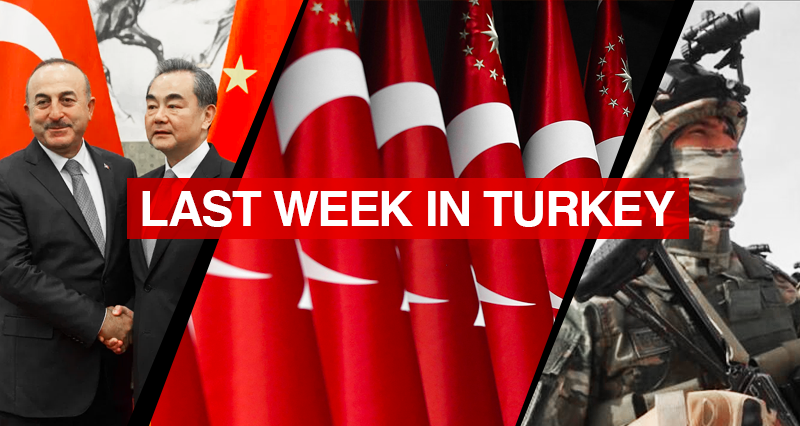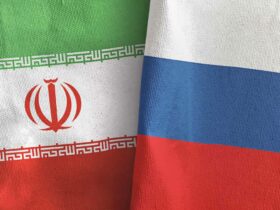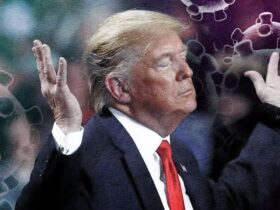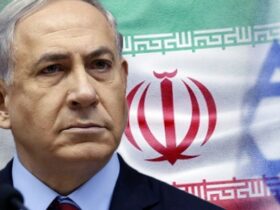Meeting between Chinese and Turkish top diplomats; Government party congress; Turkish condolences over the train accident in Egypt; Turkish-Uzbek joint military drill; Vaccination Efforts and the normalization process amidst the pandemic
Last week, the Turkish public agenda was busy with five main topics.
The first of these topics was the diplomatic visit of the Foreign Minister of the People’s Republic of China to Turkey.
The second topic was the 7thh Grand Ordinary Congress of the government party, Justice and Development Party (AKP).
The third topic was the condolences sent by the Turkish Foreign Ministry to Egypt over a train accident that took place in the country.
The fourth topic was the joint military drill, conducted by the Turkish and the Uzbek Armed Forces.
And the fifth topic was the ongoing vaccination efforts and the normalization process over the COVID-19 pandemic.
Meeting Between Chinese and Turkish Top Diplomats
Turkish Foreign Minister Mevlut Cavusoglu and his Chinese counterpart met in the Turkish capital Ankara on Thursday.
After holding a one-to-one meeting with China’s Wang Yi, Cavusoglu said that Ankara would like to see Chinese President Xi Jinping visit Turkey and that the two countries take their relations to a level of strategic partnership.
Cavusoglu said a comprehensive consultation mechanism meeting between the two foreign ministers will be at a future date.
The two ministers then held an inter-delegations meeting.
Following the meeting, Cavusoglu said on Twitter that they discussed the potential of economic cooperation on the 50th anniversary of diplomatic relations between the two countries.
He said the two countries will enhance cooperation on vaccine efforts and fight against the pandemic.
The Turkish side also “conveyed our sensitivity and thoughts on Uyghur Turks,” he added.
Later on that day, Foreign Minister Yi has met with President Recep Tayyip Erdogan as well at the presidential complex in Ankara. The meeting lasted 70 minutes.
The Turkish Foreign Minister Mevlut Cavusoglu was again present at the meeting.
Many opposition figures from Democrat Party, Gelecek (Future) Party, Good (IYI) Party, and Saadet (Felicity) Party have joined with some separatist Uyghur families in a protest outside the Chinese Embassy in Ankara, coinciding with the Chinese foreign minister’s official visit.
The Turkic Muslim minority protesters claimed that they have not been able to contact their relatives in China’s autonomous region of Xinjiang.
A 2018 Human Rights Watch report claimed a Chinese government campaign of “mass arbitrary detention, torture, forced political indoctrination, and mass surveillance of Xinjiang’s Muslims.”
However, China has repeatedly denied allegations that it is operating detention camps in its northwestern Xinjiang region, home to the Uyghur community, claiming instead that the camps’ purpose is “vocational training and re-educating” Uyghurs.
Government Party Congress
The government party, Justice and Development (AKP) has held a congress in the capital Ankara on Wednesday, during which President Erdogan was unanimously re-elected as the leader of the AKP.
After being nominated by top party officials, Recep Tayyip Erdogan was re-elected chairman for a seventh term at the party’s 7th Ordinary Grand Congress.
Out of 1,431 ballots, Erdogan got 1,428 valid votes, and there were three spoiled ballots, according to Ali Ihsan Yavuz, the party’s deputy chair.
Speaking after the vote, Erdogan thanked his fellow party members for deeming him worthy of the post.
“I wish from God that our congress will be beneficial for our country, nation, and party. I would like to thank each and every one of you for deeming me worthy of the chairmanship once again,” he told the voters.
“As the AK Party, we will continue to work for our 2023 goals with new enthusiasm and greater desire. Let’s not forget that 2023 will be a new year of victory for the People’s Alliance. Let’s not forget that the People’s Alliance is not a desk alliance, but a consensus of hearts,” he added, referring to the AKP-MHP alliance, formed ahead of the June 2018 general elections.
Separately, the party also elected 75 members of its Central Decision and Executive Board (MKYK).
Numan Kurtulmus and Binali Yildirim became the deputy chairmen of the AKP, while Omer Celik was re-elected the party’s spokesman.
Fatih Sahin will serve in AKP’s Central Executive Board as the secretary-general and Hayati Yazici became the director for the party’s political and legal affairs.
While Naci Bostanci continues to serve as the parliamentary group chairman of the party, Mahir Unal and Mustafa Elitas became the parliamentary group deputy chairman.
Bulent Turan, Emin Akbasoglu, and Cahit Ozkan are other parliamentary group deputy chairmen of the AKP.
MHP leader Devlet Bahceli and President of the Turkish Republic of Northern Cyprus Ersin Tatar congratulated Erdogan separately on his re-election as the party chairman over the phone.
Separately, Fener Greek Patriarch Bartholomew, head of Armenian Patriarchate of Turkey Sahak Mashalian, Chief Rabbi of the Jewish community in Turkey Ishak Haleva, and the Metropolitan Bishop of the Istanbul-Syriac Church Yusuf Cetin also congratulated Erdogan by phone.
President Erdogan gave a speech regarding the regional and the global situation that Turkey is facing during the Congress.
Situated at the crossroads of Africa, Asia, and Europe, Turkey does not have the luxury of turning its back on either the East or West, Erdogan said, adding that it will set its foreign policy while protecting its own national and international rights.
“From the US to Russia, the European Union to the Arab region, we will continue to shape our relations with all countries in line with Turkey’s interests and the expectations of our nation,” he countied.
“We are among the world’s top five countries with the most widespread foreign mission network,” he added, stressing that Ankara can resolve any issue with countries that respect Turkeys’ national interests.
In the speech, he stressed many regional crises such as the crisis in Libya, in Nagorno-Karabakh and Syria, as well as the national issue of economic fluctuations and the call for a new constitution.
Erdogan repeated his emphasis on the idea that “the world is bigger than five”, which is an implication of the necessity of a new global security system that could evaluate the interests of every country equally, instead of the five permanent Security Council members of the UN.
Turkey offers condolences over the recent train accident in Egypt
A train crash took place in killing at least 32 people and leaving 108 injured on Fridays, the Egyptian Health Ministry said in a statement.
The crash took place near the Al-Ibrahimiyya area in Egypt’s Sohag Governorate.
The accident was caused when emergency brakes on one of the train’s wagons were pulled by unknown persons, according to initial findings.
Many leaders from the Arab/Islamic world, such as the leaders of Jordan, the UAE, Iraq, Bahrain, and the Secretary-General of the Organization of Islamic Cooperation, have sent messages of condolence to Egypt.
Turkey has also expressed its condolences to Egypt the same day that the train accident took place.
“We have received the news with deep sorrow that at least 30 people lost their lives and many were injured in a train collision today in Sohag province, Tahta district of Egypt,” reads a Foreign Ministry statement.
Extending condolences “to the friendly and brotherly people of Egypt as well as the families of the deceased,” the statement further wished “God’s mercy upon those who lost their lives in the collision and a swift recovery to the injured.”
On Twitter, Turkey’s Vice President Fuat Oktay also expressed “deep sorrow” over the incident and wished a “swift recovery to the injured.”
Also on Twitter, Omer Celik, spokesman for the ruling Justice and Development Party (AKP), extended condolences and wished the wounded a quick recovery.
Turkish-Uzbek Joint Military Drill
A Turkish Armed Forces joint military exercise with Uzbek troops started Monday in the southern Uzbek city of Tirmiz.
According to an Uzbek Defense Ministry statement, an opening ceremony was held for drills with the presence of special force units of both countries’ military officials.
During the exercises, soldiers from the two countries will take part in a variety of drills, including crossing a 15-kilometer special tactic corridor, special shooting, close combat, and survival in harsh conditions.
In addition to the special tactics training, the participating soldiers will also hold joint sports events.
The Turkish military chief on Tuesday had also attended the drill and met his Uzbek counterpart in the capital Tashkent as part of his official visit.
Uzbekistan’s Shuhrat Halmuhammedov welcomed Turkish Chief of General Staff General Yasar Guler with a military ceremony, followed by the meeting of the two officials to discuss bilateral military relations and cooperation.
“Uzbekistan, with which we share deep historical and cultural heritage, has a special place in our hearts. Hence, we attribute special importance to improving the military ties between two brotherly countries. Our armed forces are ready to share their experiences with the Uzbek armed forces,” he remarked.
Halmuhammedov, for his part, said that Turkish-Uzbek relations, which are based on solid historical bonds, have recently been improving further thanks to the remarkable efforts of both countries’ leaders.
Referring to joint drills of the Turkish and Uzbek special forces that started on Monday in the southern Uzbek city of Tirmiz, he said: “Such drills will allow us to learn from Turkish armed forces expertise in counter-terror operations and will contribute to boosting bilateral military cooperation.”
Following his visit to the historical Semerkant and Tirmiz cities, Guler attended the joint drills on Thursday, which continued until Saturday.
Vaccination Efforts and the Normalization Process amidst the Pandemic
Turkey began a mass COVID-19 vaccination drive in early January and has administered over 14.71 million vaccine doses until Sunday, (6.48 million of which have received their second doses) according to official figures.
Turkey also has been implementing nighttime and a weekend curfew in order to prevent the spread of the virus.
However, Turkey still could not halt the spread of the virus, and has reported over 29,058 new coronavirus cases (1305 symptomatic) as of Sunday, pushing its overall tally above 3.2 million.
With 153 more fatalities on Sunday, the nationwide COVID-19 death toll has reached 31,076.
As many as 17,164 more patients won the battle against the disease on Sunday only, taking the number of recoveries past 2.95 million.
More than 37.87 million coronavirus tests have been conducted in Turkey so far.
The latest figures show that the number of COVID-19 patients in critical condition stands at 1,968.
In a positive development, Health Minister Fahrettin Koca said Turkey will start vaccinating people aged above 60 years and some risk groups.
“Citizens over the age of 60 will be able to get the vaccination by appointment with their spouses. Besides, some risk groups were included in the program,” Koca said on Twitter.
“Patients with morbid obesity, cancer with a malignant tumor, and those who receive dialysis, as well as people with Down’s syndrome and those receiving immunosuppressive treatment were identified in the system for priority vaccine shots,” Koca said.
“We want to protect our most vulnerable citizens as soon as possible,” he added.
A total of 100 million doses of COVID-19 vaccines are expected to arrive in Turkey by the end of May, the country’s health minister said on Thursday.
Speaking after a virtual meeting of the Coronavirus Scientific Advisory Board, Fahrettin Koca said that so far 1.4 million Pfizer-BioNTech vaccine shots have also arrived in Turkey, and the figure is expected to reach 4.5 million by April.
He added that an optional deal for another 30 million shots from Pfizer-BioNTech has also been made.
“Turkey has started phase 1 trials of virus-like particle vaccine today – one of the most innovative vaccine candidates in the world,” the minister said.
Saying that Turkey has made significant progress in developing indigenous COVID-19 vaccines, Koca shared that one candidate, developed by Turkey’s Erciyes University, will enter phase 3 trials by the end of April as the last volunteer will get a second dose on April 9.

















Leave a Reply